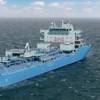Riding Out the Economic Cycle
The roll call of countries and regions now declaring themselves in recession keeps growing, and credible economists around the world offer little hope for relief in the short term. While the impact of the economic turmoil on financial institutions and on global credit liquidity has been written about exhaustively, the impact is now spreading far beyond the Wall Street world, touching businesses that until recently were healthy and growing.
For both the marine industry and the insurers who partner with them to protect shipping, the recession threatens an abrupt halt to the unprecedented boom times of recent years. While key indicators of marine industry prosperity are eroding, there nonetheless is a rationale for remaining calm about the future – as well as strategic reasons to make careful decisions about spending cutbacks that marine operators may be tempted to make to stay afloat until better times.
Sinking Statistics
The International Monetary Fund (IMF) recently reported it is expecting global economic activity to slow from growth of 5 percent in 2007 and 3.75 percent in 2008 to only about 2 percent in 2009 – well below the 3 percent mark that IMF’s experts consider to be the hallmark of a global recession. , and the 15 countries that make up the Eurozone have seen the two quarters of declining productivity that are the widely seen as a signal of recession at the country level. In addition, the double-digit growth of economies in and have stalled.
These dour statistics are reflected in the shipyards and ports of the world in a number of ways:
· Driven by faltering consumer demand, annual global container trade growth is trending downward, falling below double digits for the first time since 2001, according to shipbroker Clarkson. In response, ocean freight rates are dropping and there is a decline in ship charter rates.
· With credit frozen and future demand for container volume uncertain, ship orders have fallen 49 percent this year, Clarkson reports. Only 179 ships have been ordered in the first eight months of 2008, compared to 530 orders in 2007. In the , construction of commercial vessels is still going strong, but pleasure boat builders are struggling and inventories are higher than normal.
· With purchasers unable to obtain financing they had counted on, many believe a large number of ships already on order will never be built. Nordea Bank reports that $300 billion in financing is needed to construct all vessels already on order. And Seaspan Corp., a Hong Kong-based ship lessor, estimates that at least a quarter of all container ships, dry-bulk vessels and oil tankers now on the books do not have financing lined up.
· Shippers who hold long-term charters already have hit the wall financially. Anecdotal evidence indicates that some are simply turning in their vessels before the end of the charter period, walking away from their lease obligations.
The Insurance Perspective
While the statistics indicate a marine industry under pressure, the insurers that they rely on to cover their risk are facing their own challenges. Those of us who have been around long enough know that the economics of insurance often runs counter-cyclical to the maritime industry’s ups and downs.
What does this mean for shippers? During the past few years of rapid growth for shipping, competition increased among insurers drawn to the maritime opportunities, which led to a soft pricing environment. Now, however, there are many factors at work that may drive out competitors from the market and force a harder look at premium structures by those still in the business.
Among those factors is the difficulty of earning a healthy return on investments in today’s financial markets. Since insurers cover losses with a combination of funds from premiums and investment earnings, declining investment returns alter the equation for pricing. In addition, some insurers may not have enough liquidity and assets to cover obligations.
Another factor driving costs is the heavy losses that insurers have had to cover in 2008 from natural disasters, including Hurricane Ike. Risk Management Solutions recently estimated that total damage from Ike may reach $21 billion, which would make it the third most expensive storm in history (behind Hurricanes Katrina and Andrew).
The bottom line: Even as the maritime industry is begin to adjust to today’s volatility, insurers are also coping with changing market conditions.
Staying Afloat
Many ship owners and operators are looking hard at ways to stay afloat until the storm is behind us. One potential target is their insurance costs. It’s important to understand the dangers, however, of taking on added risk at the exact time that one’s revenues are diminishing. In an environment where people may already be cutting corners and taking chances because of economic pressures, the last thing a ship owner needs is to face an unexpected liability that cannot be covered out of operating funds or liquid assets. A better alternative than forgoing coverage may be to look at the feasibility of increasing deductibles.
Most of all, it is important for those in the marine industry and their insurance partners to keep the long term firmly in mind. Despite the gloomy outlook, there are ample reasons to take the challenges in stride. First, recessions since World War II typically have been short-lived, lasting six to 18 months, for an average of 11 months. While there is no denying the current conditions appear more dire than normal, the experts at the IMF believe conditions will improve by late 2009.
Second, the downturn has brought a silver lining of good news. Commodity prices, and most particularly the cost of oil, have fallen sharply. Since fuel is a major cost factor for vessel operators, the reduction brings welcome financial relief at a time when it is sorely needed.
Third, as the world’s economic leaders have come together to address the issues underlying the financial collapse, there has been specific reassurance that there is little support for retreating from free trade. Thus, once conditions are normalized, there is the expectation that global trade will resume the growth patterns that have been so beneficial for shippers over the past few years.
The economic cycle that we are riding out now may be the worst that many of us have seen. But it is only a cycle, and we can all with some assurance look to a future of better times and a return to prosperity.
(originally published in the January 2009 edition of Maritime Reporter & Engineering News, www.marinelink.com)














